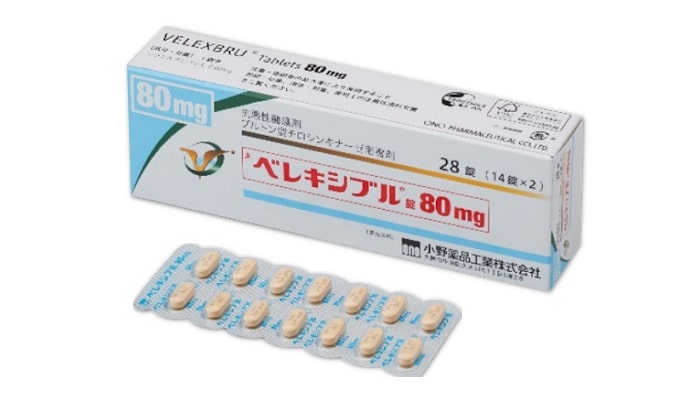Keytruda (pembrolizumab) vs Velexbru (tirabrutinib hydrochloride)
Keytruda (pembrolizumab) vs Velexbru (tirabrutinib hydrochloride)
Keytruda (pembrolizumab) is an immune checkpoint inhibitor that works by blocking the PD-1 pathway, which helps the immune system to detect and fight cancer cells, and is commonly used in various types of cancers including melanoma, lung cancer, and head and neck cancers. Velexbru (tirabrutinib hydrochloride), on the other hand, is a Bruton's tyrosine kinase (BTK) inhibitor used primarily for treating certain blood cancers like mantle cell lymphoma and is involved in the intracellular signaling pathways that regulate the survival and proliferation of B cells. The choice between Keytruda and Velexbru would largely depend on the type of cancer being treated, as their mechanisms of action and approved indications differ significantly, making it crucial for a patient to consult with their oncologist to determine which medication is appropriate for their specific condition.
Difference between Keytruda and Velexbru
| Metric | Keytruda (pembrolizumab) | Velexbru (tirabrutinib hydrochloride) |
|---|---|---|
| Generic name | Pembrolizumab | Tirabrutinib hydrochloride |
| Indications | Various types of cancers including melanoma, lung cancer, head and neck cancer, Hodgkin lymphoma, and others | Relapsed or refractory primary central nervous system lymphoma (PCNSL) |
| Mechanism of action | Programmed death receptor-1 (PD-1) blocking antibody | Bruton's tyrosine kinase (BTK) inhibitor |
| Brand names | Keytruda | Velexbru |
| Administrative route | Intravenous infusion | Oral |
| Side effects | Fatigue, musculoskeletal pain, decreased appetite, pruritus, diarrhea, nausea, rash, pyrexia, cough, dyspnea, constipation, pain in extremity, and headache | Neutropenia, thrombocytopenia, rash, diarrhea, muscle spasms, and anemia |
| Contraindications | Individuals with a history of severe hypersensitivity to pembrolizumab or any of its excipients | Not specified; use caution in patients with a history of severe hypersensitivity to tirabrutinib or its excipients |
| Drug class | Anti-PD-1 monoclonal antibody | BTK inhibitor |
| Manufacturer | Merck & Co. | Ono Pharmaceutical Co., Ltd. |
Efficacy
Efficacy of Keytruda (Pembrolizumab) in Lymphoma
Keytruda, known generically as pembrolizumab, is a monoclonal antibody that has been used in the treatment of various types of cancer, including lymphoma. Specifically, it has shown efficacy in treating Hodgkin lymphoma (HL) and primary mediastinal large B-cell lymphoma (PMBCL), a type of non-Hodgkin lymphoma. Pembrolizumab works by blocking the PD-1 pathway, which cancer cells often exploit to evade the immune system. By inhibiting this pathway, Keytruda can enhance the body's immune response against cancer cells.
In clinical trials, pembrolizumab has demonstrated a significant response rate in patients with relapsed or refractory classical Hodgkin lymphoma. The drug has been granted approval by regulatory agencies for the treatment of adult and pediatric patients with refractory classical HL or those who have relapsed after three or more prior lines of therapy. The efficacy of pembrolizumab in these settings highlights its role as a valuable treatment option for patients with limited alternatives.
Efficacy of Velexbru (Tirabrutinib Hydrochloride) in Lymphoma
Velexbru, with the active ingredient tirabrutinib hydrochloride, is a Bruton's tyrosine kinase (BTK) inhibitor used in the treatment of B-cell malignancies, including certain types of lymphoma. Tirabrutinib has shown efficacy in treating relapsed or refractory mantle cell lymphoma (MCL), which is a subtype of non-Hodgkin lymphoma. The mechanism of action of tirabrutinib involves the selective inhibition of BTK, which is a key component of the B-cell receptor signaling pathway that is critical for the survival and proliferation of malignant B cells.
Clinical studies of tirabrutinib in patients with B-cell lymphomas have reported promising response rates, particularly in mantle cell lymphoma. The drug has been approved in some jurisdictions for the treatment of relapsed or refractory MCL, offering a new therapeutic option for patients who have not responded to or have relapsed after other treatments. The ongoing research and clinical trials continue to evaluate the broader potential of tirabrutinib in various lymphoma subtypes, which may expand its indications in the future.
Regulatory Agency Approvals
Keytruda
-
European Medical Agency (EMA), European Union

-
Food and Drug Administration (FDA), USA

-
Health Canada

-
Therapeutic Goods Administration (TGA), Australia

-
Medsafe (NZ)

Velexbru
-
Pharmaceuticals and Medical Devices Agency (PMDA), Japan

Access Keytruda or Velexbru today
If Keytruda or Velexbru are not approved or available in your country (e.g. due to supply issues), you can access them via Everyone.org.
How it works

Make an enquiry
Choose the medicine you want to buy, answer a couple of questions, and upload your prescription to speed things up. We’ll get back to you within 24 hours.


Make an enquiry
Choose the medicine you want to buy, answer a couple of questions, and upload your prescription to speed things up. We’ll get back to you within 24 hours.


Breeze through the paperwork
We'll guide you through the required documents for importing unapproved medicine, ensuring you have all the necessary information.


Get a personalized quote
We’ll prepare a quote for you, including medicine costs and any shipping, administrative, or import fees that may apply.


Receive your medicine
Accept the quote and we’ll handle the rest - sourcing and safely delivering your medicine.

Some text on this page has been automatically generated. Speak to your physician before you start a new treatment or medication.
Let's talk
If you have any questions, call us or send us a message through WhatsApp or email:
Contact us




